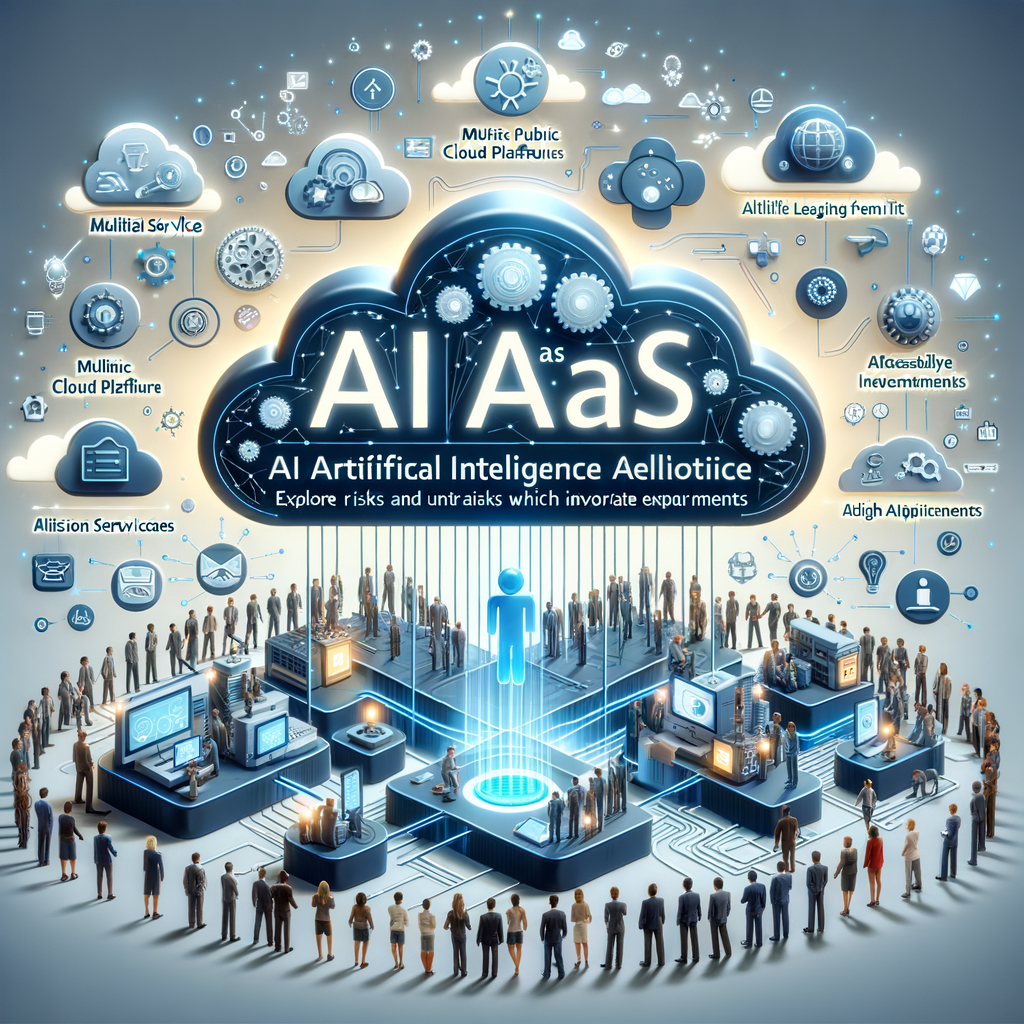Artificial Intelligence as a Service
AI as a Service (AIaaS) represents a cloud-based solution for outsourcing artificial intelligence (AI) functionalities. It empowers individuals and businesses to explore and deploy AI applications at scale, minimizing risks and upfront investments. The accessibility of AIaaS facilitates experimentation across various public cloud platforms, services, and machine learning algorithms.
A key advantage of AIaaS is the inclusion of specialized hardware and software by the cloud provider, tailored to the service. For instance, applications like computer vision heavily rely on hardware such as GPUs or FPGAs due to their computational demands. Procuring and managing such infrastructure independently can be cost-prohibitive for many organizations. With AIaaS, companies can access AI services along with the necessary infrastructure for seamless operation.
In this article series, we delve into the landscape of machine learning in the cloud, examining:
Types of AIaaS
- Bots and Digital Assistants: These AIaaS solutions facilitate the implementation of virtual assistants, chatbots, and automated email response systems. Leveraging natural language processing (NLP), they learn from human interactions, finding applications in customer service and marketing domains.
- Application Programming Interface (APIs): AIaaS offerings furnish APIs for seamless integration of AI functionalities into software applications. Developers can effortlessly incorporate AI capabilities into their projects, including natural language processing and computer vision tasks.
- Machine Learning (ML) Frameworks: While traditional ML frameworks empower developers to build custom AI models, AIaaS platforms in a Platform as a Service (PaaS) model offer fully managed ML frameworks. These platforms streamline the end-to-end machine learning operations (MLOps) pipeline, from data preparation to model deployment.
- No-Code or Low-Code ML Services: Fully managed ML services cater to organizations lacking in-house data science expertise. These services provide pre-built models, templates, and intuitive interfaces, eliminating the need for extensive development efforts.
- Natural Language Processing (NLP) Services: These AIaaS offerings are designed to understand, interpret, and generate human language in a way that is valuable for businesses. NLP services can include sentiment analysis, text classification, entity recognition, and language translation, enabling applications such as content categorization, customer feedback analysis, and multilingual support.
- Computer Vision Services: AIaaS platforms provide computer vision capabilities that allow applications to interpret and understand the visual world. These services can include image recognition, object detection, facial recognition, and optical character recognition (OCR). They find applications in security and surveillance, retail, healthcare for medical image analysis, and autonomous vehicles for environmental perception.
- Predictive Analytics Services: Leveraging machine learning and data analytics, these services offer the ability to predict future outcomes based on historical data. Businesses use predictive analytics for forecasting customer behavior, demand forecasting, risk management, and more, enabling more informed decision-making.
- Speech Recognition Services: These services convert spoken language into text or execute commands based on voice inputs. Speech recognition is pivotal in developing voice-activated assistants, dictation applications, and customer service bots, enhancing accessibility and user experience.
- Recommendation Systems: AIaaS platforms provide recommendation engines that help businesses offer personalized suggestions to users. These systems analyze user behavior, preferences, and interactions to recommend products, content, or services, widely used in e-commerce, streaming services, and content platforms.
- Data Labeling and Annotation Services: Essential for training machine learning models, these services facilitate the labeling and annotation of large datasets. They can include image annotation, text categorization, and labeling for supervised learning, often incorporating human in the loop (HITL) approaches to ensure data quality.
- AI-Enabled Business Intelligence (BI): These services transform raw data into meaningful insights through AI and machine learning. AI-enabled BI tools offer advanced data visualization, trend analysis, and anomaly detection, helping businesses to derive strategic insights from their data pools.
- Generative AI Services: Offering tools for content creation, these services use AI to generate text, images, videos, or music that can be customized for specific needs. Applications include automated content generation for marketing, creative design, and personalized media production.

Top AI as a Service Companies
- Microsoft Azure: Azure offers a range of AI services including Cognitive Services, Cognitive Search, Azure Machine Learning (AML), and Bot Services, enabling developers to build, train, and deploy AI models efficiently.
- Amazon Web Services (AWS): AWS provides Sagemaker for building and deploying ML models, Lex for chatbot development, Polly for speech-enabled applications, and Rekognition for computer vision tasks.
- Google Cloud: Google Cloud’s AI offerings encompass AI Platform, AI Hub, and Conversational AI services, facilitating scalable ML model development and deployment.
- IBM Cloud: IBM offers a robust suite of AI services under Watson, including Watson Assistant for building conversational interfaces, Watson Discovery for insights from data, and Watson Machine Learning for creating and deploying ML models. IBM’s AI services are designed for complex enterprise needs, offering deep learning, natural language processing, and data analytics capabilities.
- Salesforce Einstein: Salesforce integrates AI across its customer relationship management (CRM) platform through Einstein Analytics. It offers predictive analytics, natural language processing, and automated task management features, making AI accessible within the Salesforce ecosystem for sales, marketing, and service applications.
- Oracle Cloud AI: Oracle provides AI services to augment its cloud applications, offering AI solutions for finance, HR, customer experience, and more. Its AI capabilities include data analysis, machine learning, adaptive intelligent apps, and digital assistants, designed to enhance business processes and decision-making.
- SAP Leonardo: SAP’s AI framework integrates machine learning, IoT, analytics, and blockchain into the SAP Cloud Platform. Leonardo enables intelligent applications and analytics in various business processes, supporting innovation in areas like finance, procurement, and manufacturing.
- Alibaba Cloud: Alibaba’s AI program offers a broad range of machine learning and AI services, including image and video recognition, natural language processing, and deep learning platforms. Its services are tailored to empower businesses with AI-driven insights and efficiencies, particularly within the e-commerce, finance, and logistics sectors.
- Adobe Sensei: Adobe’s AI and machine learning framework enhances its Creative Cloud, Experience Cloud, and Document Cloud solutions. Sensei automates and improves tasks such as image editing, targeting and personalization in marketing campaigns, and document understanding, leveraging AI to augment creative and business workflows.
- H2O.ai: H2O.ai provides an open-source machine learning platform, H2O, and a fully managed service, H2O AI Cloud. It’s focused on making AI accessible to businesses through automatic machine learning (AutoML), which simplifies the process of developing and deploying AI models.
- Kaggle: While primarily known for its competitions, Kaggle offers a cloud-based workbench for data science. It provides access to datasets, computational resources, and a community of data scientists and ML practitioners, facilitating collaborative AI and machine learning projects.
anysmart.ai offers a lot of AI services from the top of big companies in AI industry
AI as a Service: Benefits and Challenges
AIaaS presents several advantages, including rapid deployment, stability in handling diverse data conditions, and long-term value through outsourced maintenance. However, challenges such as data security, reliance on third-party vendors, lack of transparency, and unforeseen costs must be navigated.


